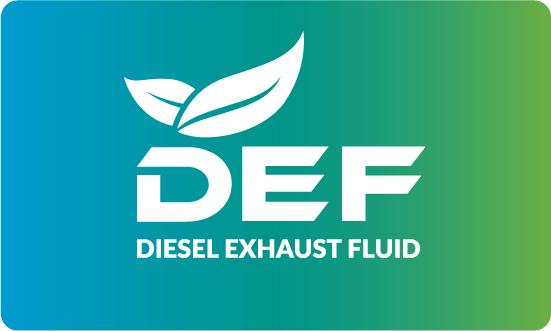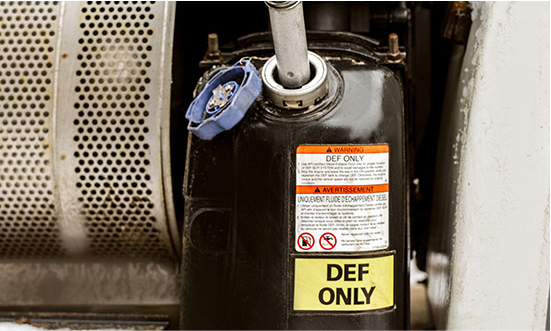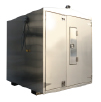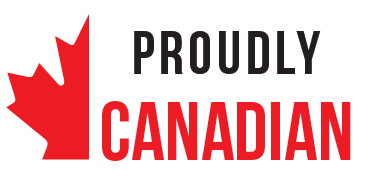DIESEL EXHAUST FLUID (DEF)
Diesel Exhaust Fluid (DEF) Solutions for Your Business
At Brown’s Fuels, we proudly serve the Golden Horseshoe area and the GTA as a trusted fuel supplier, locally owned for over 25 years.
We understand the importance of balancing environmental compliance with operational performance. That’s why we offer premium Diesel Exhaust Fluid (DEF) products and tailored delivery solutions to keep your fleet running efficiently. Backed by expert support and a focus on customer satisfaction, we ensure your operations meet emissions standards without disruption.
What is Diesel Exhaust Fluid (DEF)?
DEF is an emissions control fluid required by today’s modern diesel engines. It’s a harmless solution made up of 32.5 % urea in 67.5% de‐ionized water. DEF is clear, and colorless, looks likes water but smells like ammonia. DEF is used by Selective Catalytic Reduction (SCR technology) to remove harmful emissions. DEF is contained in a designated DEF tank on the vehicle. Never fill the diesel fuel tank with DEF or try to use it as a fuel additive.
Shelf Life: DEF has a shelf life of 12 months if stored properly. DEF stored beyond this period may still be usable if tested and confirmed to meet specifications.


How Does DEF Work?
DEF operates through the Selective Catalytic Reduction (SCR) process. SCR technology was introduced to meet 2010 emission standards by reducing NOx emissions from diesel engines. When DEF is sprayed into the exhaust stream, it reacts with a catalyst to convert NOx gases into nitrogen and water vapor.
SCR technology has been used for decades in power generation and has been adopted by North American diesel engine manufacturers to meet EPA standards. It enhances engine performance and fuel efficiency while reducing emissions.
Benefits of Using DEF
Reduced Pollution
The main reason selective catalytic reduction was introduced was to help the environment. Diesel has been known to emit NOx emissions, typically blamed for causing acid rain and the greenhouse effect. With DEF turning the emissions into nitrogen and water, this is much more environmentally friendly.
Reduced Maintenance
Engines designed with SCR technology have less wear and tear on their vehicles than those without, reducing the need for maintenance. Reduced maintenance also means that your vehicle is less likely to break down.
Frequently Asked Questions
What is DEF and how should it be used?
DEF is a mixture of high purity urea (32.5%) and water (67.5%). It is used to chemically reduce the concentration of nitrogen oxide (NOx) in the exhaust emissions from diesel engines.
DEF works through a process called Selective Catalytic Reduction (SCR). SCR uses a catalyst system containing ammonia to break down Nitric oxide (NOx) emissions. SCR can break down those emissions once DEF gets sprayed into the exhaust stream.
DEF is contained in a designated DEF tank on the vehicle. Never fill the diesel fuel tank with DEF or try to use it as a fuel additive.
Is DEF dangerous?
DEF is non-toxic, stable, odourless and colourless. If it gets on your skin or clothes, rinse with water. If in eyes, flush with clean water for at least 15 minutes. Although DEF is colourless, avoid spilling on clothing or vehicle upholstery.
What makes DEF API Certified?
Heavy-duty vehicle manufacturers demand a high level of purity for DEF to honour the warranty they give on their vehicles. DEF is a quality fluid that is API certified and meets ISO 22241 to ensure its purity and composition. It is delivered in dedicated, sealed DEF containers for protection from contamination, to help prevent damage to the vehicle’s catalyst.
How should DEF be stored?
DEF should be stored in a cool, dry, well-ventilated area at a constant temperature. For optimal shelf life (12 months), store between 86°F/30°C and 12°F/-11°C. It is better to keep DEF indoors, but an outdoor heated enclosure/container is also suitable. Avoid storing in direct sunlight. DEF will freeze at 12°F/-11°C. However, frozen fluid can be thawed and used without concerns of product degradation.
How Often Does DEF Have to Be Refilled?
For typical trucks and SUVs, a tank of DEF needs to be refilled about as often as changing your oil. For semi-trucks, refill is required a lot more frequently due to the mileage on your truck.
How Will I Know if I’m Low On DEF?
Similar to when you are low on gas, you’ll know when you are low on DEF. All engines designed with SCR also come equipped with a gauge to display the DEF fuel levels. If you run out of DEF, lights will flash to notify you. Unlike gas, if you run out of DEF, it won’t impact the functioning of your vehicle.
How much DEF Do I Need?
DEF does not have to be replenished every time the diesel fuel tank is being filled.
The required amount is about 3% of the vehicle’s diesel fuel consumption, i.e. For every 100 gallons of diesel fuel consumed, only 3 gallons of DEF is required.
Customized Solutions
Brown’s Fuels provides DEF storage solutions and larger tank options to suit your specific requirements. Our tailored services ensure that your DEF supply is managed effectively, supporting your operational needs and environmental goals.

We offer DEF in the following formats:
- Jugs (9.4L)
- Drums (202L)
- Bulk (1200L totes)
- Direct to equipment (wheel to wheel)

Larger on-site storage solutions include:
Fuel Your Future with Confidence!
Whether you’re a commercial enterprise or a residential customer, Brown’s Fuels has the solutions you need. Contact us today to explore our reliable fuel options and exceptional service tailored to your needs.
Call Today 905-875-4800
